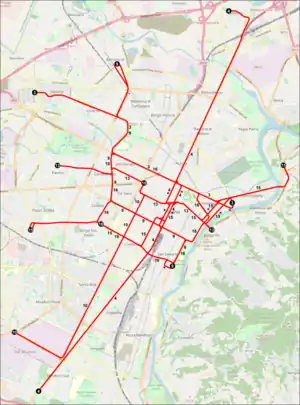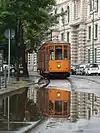| Turin tramway network | |||||||||||||||||||
|---|---|---|---|---|---|---|---|---|---|---|---|---|---|---|---|---|---|---|---|
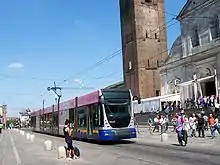 Turin tram ATM 6000 | |||||||||||||||||||
| Operation | |||||||||||||||||||
| Locale | Turin, Piedmont, Italy | ||||||||||||||||||
| |||||||||||||||||||
| |||||||||||||||||||
The Turin tramway network (Italian: Rete tranviaria di Torino) is an important part, along with the Turin Metro, of the public transport network of the city and comune of Turin, in the Piedmont region, northwest Italy.
In operation since 1871, the network is about 88 km (55 mi) long,[1] and comprises 10 lines.
The network
Urban lines
The Turin tramway network has 10 lines (for a total of 11 routes):
- 3 Corso Tortona - Piazzale Vallette (9,35 km)
- 4 Strada del Drosso - Via delle Querce (17,8 km)
- 7 storica Piazza Castello (circular) (6,9 km) (operated solely by heritage trams)
- 9 Piazza Stampalia - Corso Massimo D'Azeglio (9,4 km)
- 9/ Piazza Bernini - Juventus Stadium (5,5 km)
- 10 Piazza Statuto / Piazza Caio Mario- Corso Settembrini (limited operations due to track work)
- 13 feriale Piazza Campanella - Piazza Gran Madre (6,7 km)
- 15 Via Brissogne - Piazza Coriolano (11,5 km)
- 16 cs Piazza Sabotino (circular) (12 km)
- 16 cd Piazza Sabotino (circular) (12 km)
- Sassi-Superga Tramway Piazza Gustavo Modena - Basilica di Superga (3,1 km)
Light rail
Of the urban lines, lines 3 and 9 were created as a light rail tram system in the 1980s. Today, line 3 is called a "fully protected" route, while line 9 is considered an ordinary tramway.
Line 4 has characteristics similar to line 3, although another type of tram vehicle is used. In any case, this line also includes long stretches of reserved sections to permit higher speeds.
On line 3, light rail vehicles of the series 7000 were used.
Rolling stock
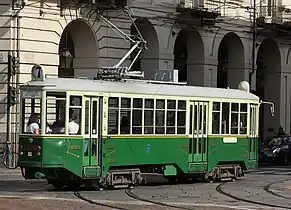 2500 series
2500 series 2700 series
2700 series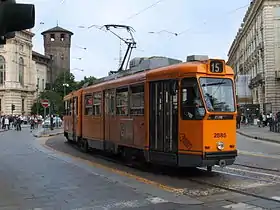 2800 series
2800 series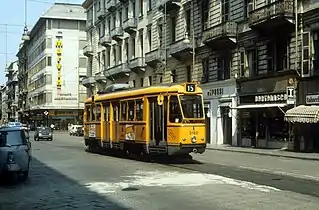 3100 series
3100 series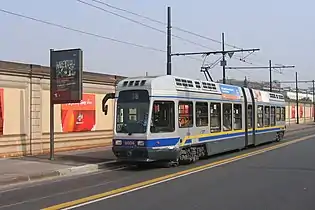 5000 series
5000 series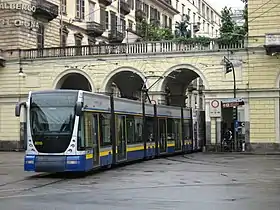 6000 series
6000 series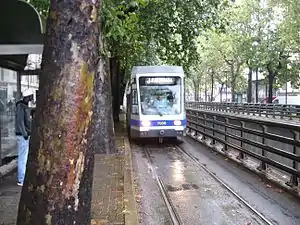 7000 series
7000 series
See also
References
Sources
- Brignole, Claudio; Schwandl, Robert (2010). Metros in Italien / Metros in Italy. Berlin: Robert Schwandl Verlag. ISBN 978-3-936573-22-0. (in German and English)
